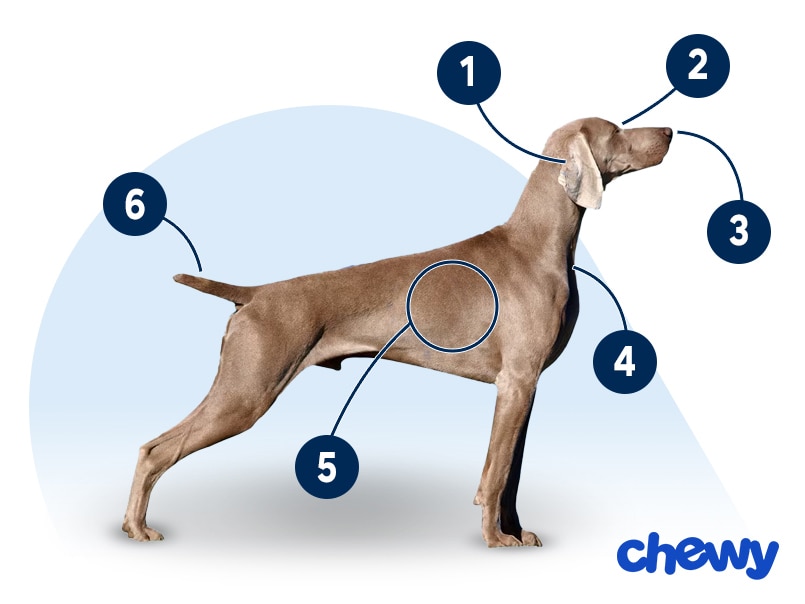Weimaraner
Updated December 15, 2025
Weimaraner
Updated December 15, 2025
The Weimaraner may look aristocratic, but don’t let that fool you. All their grace goes out the window when they’re being their charismatic, goofy selves. Athletic and social, Weimaraners adore running through a field, climbing a rugged hiking trail, and joining you on a hunting trip.
Athletic, Sidekick, Silly
55–90 pounds
23–27 inches
10–13 years
Blue, Gray, Silver Gray
You might expect a certain amount of independence from a dog the size of a small human, but you’d be wrong: The Weimaraner is a Velcro dog who needs you—and is very confused why you’re leaving for, say, the dentist without them. Weren’t they invited, too?
Thankfully, these bright pups are also adaptable, so they’ll bounce back as soon as you return from your root canal. Best of all, they’ll snuggle up to you like a perpetual toddler, happy to be with their favorite person.
Match that bonding time with lots of outdoor exercise, and you’ll have one happy pup.
Weimaraner Characteristics
Weimaraner Appearance
Weimaraners carry themselves with a royal, aristocratic air and have smooth, shimmery coats in gray, blue, and silver-gray. When they’re having a happy moment, their adorable tail swishes quickly, and their attentive eyes shine.

- Ears
Weimaraner ears are high-set, long ovals with a velvety texture.
- Eyes
Their wide, almond-shaped eyes are a pale amber, blue-gray, or gray.
- Nose
Their nose is usually gray but may also be pink.
- Coat Length
Weimaraner dog coats are short, smooth, and sleek. When kept healthy, their coat seems to shine.
- Coat Color
Weimaraner colors vary from light to dark gray, with a silvery sheen in the sunlight. Some types have a small white marking on the chest. Blue Weimaraners have a dark gray-blue coat.
- Tail
While it was once common to dock a Weimaraner’s tail, nowadays many of these pups have their tails left intact. Many groups, including the American Veterinary Medical Association, oppose tail docking, and many countries as well as U.S. states have banned the practice.
Weimaraner Temperament
Friendly and inquisitive, the social Weimaraner just wants to know what’s happening. They love human connection, and thanks to their lanky stature and quickness, it’s a delight to watch them get all excited by something and run toward whatever grabs their attention.
Weimaraner puppies need to be socialized just like all other dog breeds. And once they are, they’ll happily join you wherever they’re welcome, whether it’s on vacation, camping, or a dinner party they’ve scored an invitation to (just make sure they don’t steal any table scraps).
But as a dog originally bred for hunting, the Weimaraner is probably not going to get along so swimmingly with cats or birds. So if you’ve already got a cat, make sure to introduce your new dog to them slowly and always supervise their interactions. A Weimaraner might first see them as something to chase after.
How to Care for a Weimaraner
Your Weimaraner won’t need a lot of grooming thanks to their short and neat coat, so you can spend more bonding time on training, exercising, and teaching them new tricks.
Grooming
Training
Diet
Exercise
Environment
Weimaraner Health
The average Weimaraner lifespan is 10–13 years. Here are some health issues to be aware of.
- Bloat and gastric dilatation-volvulus (GDV): As a large dog breed with a deep chest, Weimaraners are prone to a life-threatening condition called bloat. It occurs when the stomach becomes distended with air and/or food. A serious complication of bloat is gastric dilatation-volvulus, when the stomach twists on itself, cutting off blood supply to the organs.
- If you notice signs of bloat or GDV, such as restlessness, dry heaving, excessive drooling, and a distended abdomen, take your dog to the vet immediately.
- Bowel obstruction: Weimaraners have a big appetite and aren’t picky about what they eat—no matter if it’s their dog food, people food, or even a small toy. This means that things can get stuck in their digestive track, leading to a bowel obstruction. If your pup ate something they’re not supposed to and are showing symptoms like vomiting, they will need an X-ray. If it doesn’t pass naturally, surgery might be needed.
- Elbow and hip dysplasia: Elbow and hip dysplasia are genetic conditions that develop during puppyhood when the joints don’t align well and become looser than normal. Talk to your veterinarian if you notice symptoms like limping or difficulty moving around.
- Entropion: Entropion is an eyelid abnormality in which a dog’s eyelid rolls in on itself (potentially causing pain, eye infections, and ulcers on the cornea). Surgery is an option for severe cases.
- Hypothyroidism: Common in this breed, hypothyroidism includes symptoms like lethargy, hair loss, skin infections, ear infections, and weight gain. A blood test can diagnose it, and treatment is a daily oral medication.
Weimaraner History
The Weimaraner first appeared in the 19th century and is the result of several breeds, including the Bloodhound and French and German hunting dogs, and they were initially used for sport, including to hunt wolves, bears, and mountain lions—all of which seem ludicrous today for this gentle family breed.
The dog came to the U.S. in the 1920s, and the American Kennel Club recognized them in 1943. Fans included President Dwight D. Eisenhower and actress Grace Kelly.
Weimaraner puppies tend to cost as much as $3,000. If you choose this route, pick a responsible breeder.
You can also consider Weimaraner adoption. Check out local rescues like the Great Lakes Weimaraner Rescue, keep an eye out at your local animal shelter, or search Chewy’s database of adoptable dogs in your area.







